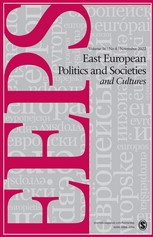Post-Dissident Politics and the “Liberal Consensus” in East-Central Europe after 1989
Post-Dissident Politics and the “Liberal Consensus” in East-Central Europe after 1989
Author(s): Michal KopečekSubject(s): Political history, Recent History (1900 till today), Transformation Period (1990 - 2010), Post-Communist Transformation
Published by: SAGE Publications Ltd
Keywords: politics of consensus; liberal consensus; post-dissent; anti-populism; east-central Europe;
Summary/Abstract: This article’s central question is how former dissidents and their engagement in post1989 nascent democratic politics contributed to the emergence of what was later retrospectively labelled the “liberal consensus.” I look at the earliest stages of this consensus before it started to lock in the conditionality of the EU accession process. To this end, I first discuss the “liberal consensus” from a retrospective and past prospective perspective. I define the notions of “post-dissent” and liberal politics emerging after 1989 on the dissident platform. I discuss the theoretical background and historical contours of the notion of dissident “politics of consensus.” The empirical core of the study is an analysis of the birth of post-dissident liberal parties in the process of the disintegration of broad consensual democratization movements of the 1989 revolutions. The study offers a comparison of the Czech, Slovak, Hungarian, and Polish cases, analyzing their similarities and less obvious but significant differences.
Journal: East European Politics and Societies
- Issue Year: 38/2024
- Issue No: 03
- Page Range: 758-793
- Page Count: 36
- Language: English
- Content File-PDF

